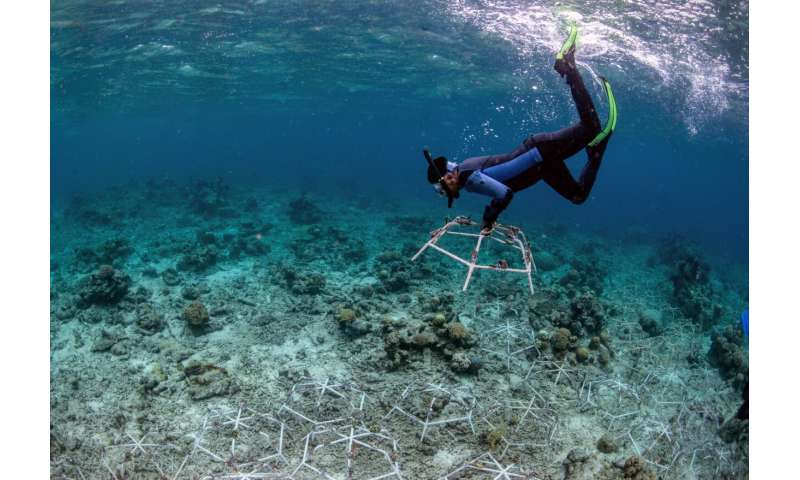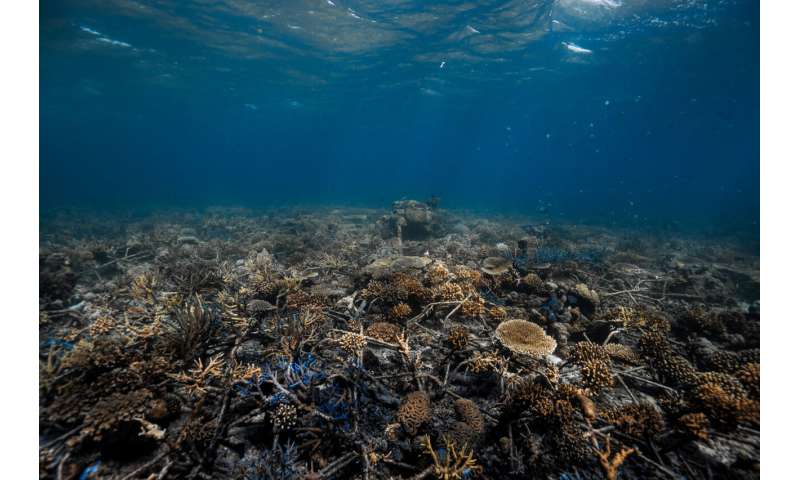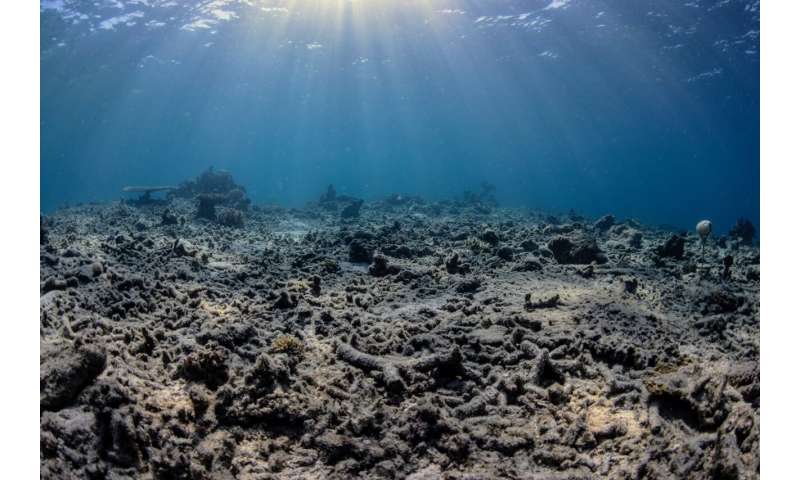This article has been reviewed according to Science X's editorial process and policies. Editors have highlighted the following attributes while ensuring the content's credibility:
fact-checked
peer-reviewed publication
trusted source
proofread
Good news for coral reef restoration efforts: Study finds 'full recovery' of reef growth within four years

While the majority of the world's reefs are now under threat or even damaged potentially beyond repair, a new study reported in the journal Current Biology on March 8 offers some encouraging news: efforts to restore coral reefs not only increase coral cover, but they can also bring back important ecosystem functions, and surprisingly fast.
"We found that restored coral reefs can grow at the same speed as healthy coral reefs just four years after coral transplantation," says Ines Lange of University of Exeter, UK. "This means that they provide lots of habitat for marine life and efficiently protect the adjacent island from wave energy and erosion."
"The speed of recovery that we saw was incredible," she says. "We did not expect a full recovery of reef framework production after only four years."
The work by Lange and her international colleagues represents the first reef carbonate budget trajectories at any coral restoration sites. The study was conducted at the Mars Coral Reef Restoration Program in South Sulawesi, Indonesia, one of the largest restoration projects in the world.
-

Reef Stars are installed in degraded areas to stabilise loose rubble and kickstart rapid coral growth. Credit: The Ocean Agency -

A restored reef, 4 years after installing Reef Stars. Credit: The Ocean Agency
The project relies on transplanting corals and adding substrate to restore reefs badly damaged by blast fishing 30 or 40 years ago. Without human intervention, those reefs had shown no signs of recovering due to the presence of loose coral rubble that prevents young coral larvae from surviving.
The restoration effort has added a continuous network of sand-coated steel structures to consolidate the rubble and offer a structure for transplanting coral fragments. The question was whether and how quickly such restored sites would recover. To find out, the researchers measured the carbonate budgets of 12 sites that had been restored at different times, up to four years ago.
"Corals constantly add calcium carbonate to the reef framework while some fishes and sea urchins erode it away, so calculating the overall carbonate budget basically tells you if the reef as a whole is growing or shrinking," Lange says. "Positive reef growth is important to keep up with sea-level rise, protect coastlines from storms and erosion, and provide habitat for reef animals."
They wanted to know how long it takes to bring back healthy reef growth and its associated functions. Their data show that rapid growth of transplanted corals supports the recovery of coral cover and carbonate production. In fact, just four years in, the net carbonate budget had tripled such that it matched that at healthy control sites.
There were some important differences, however. Because branched corals had been transplanted preferentially over other corals, the makeup of the restored reef communities differs. The researchers say those differences "may affect habitat provision for some marine species and resilience to future heat waves, as branching corals are more sensitive to bleaching."
-

A restored reef, 2 years after installing Reef Stars. Credit: Ocean Culture Life -

A damaged coral reef in Sulawesi, Indonesia. Credit: The Ocean Agency
While longer-term study is necessary to see what happens over time and under stress, the findings show that active management actions can help to boost the resilience of reefs and bring back important ecosystem functions that are critical for marine life and local communities in relatively short periods of time, according to the researchers.
They're hopeful that, over time, restored reefs will naturally recruit a more diverse mix of coral species. However, they note that what will happen in any given location around the world will depend on many factors, including environmental conditions and restoration techniques.
"As is so often the case, there is no one-size-fits-all solution, but we hope that this positive example can be used as inspiration for other reef restoration projects around the world," Lange says.
"These results give us the encouragement that if we can rapidly reduce emissions and stabilize the climate, we have effective tools to help regrow functioning coral reefs," says Tim Lamont, a study co-author at the Lancaster Environment Center, Lancaster University, UK.
More information: Coral restoration can drive rapid reef carbonate budget recovery, Current Biology (2024). DOI: 10.1016/j.cub.2024.02.009. www.cell.com/current-biology/f … 0960-9822(24)00151-9
Journal information: Current Biology
Provided by Cell Press




















